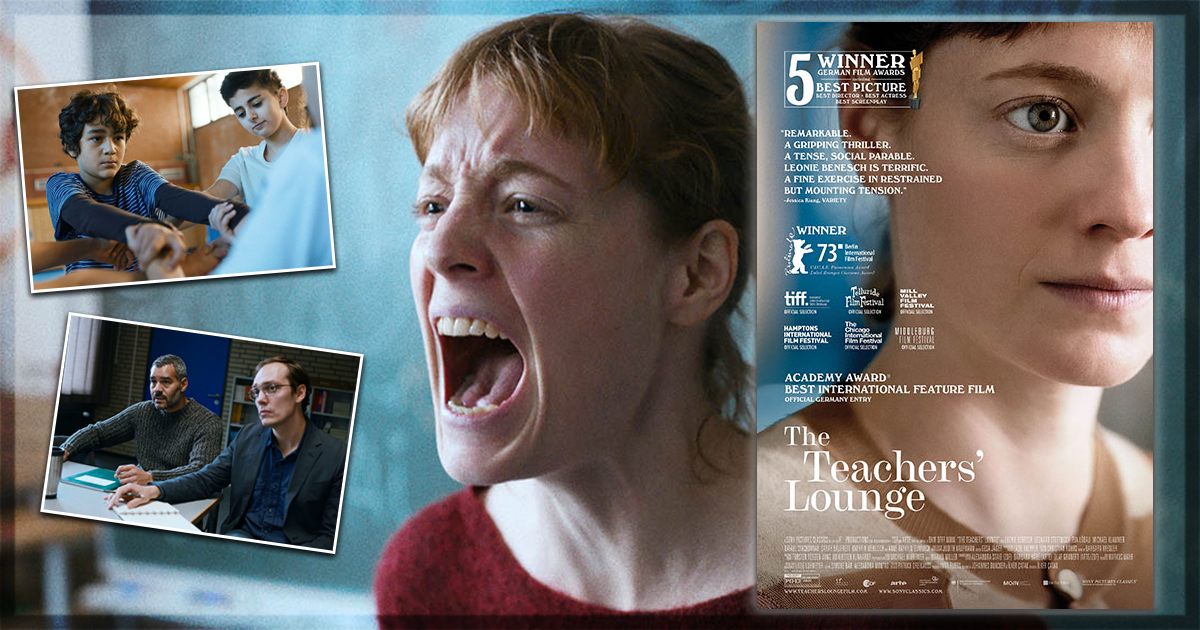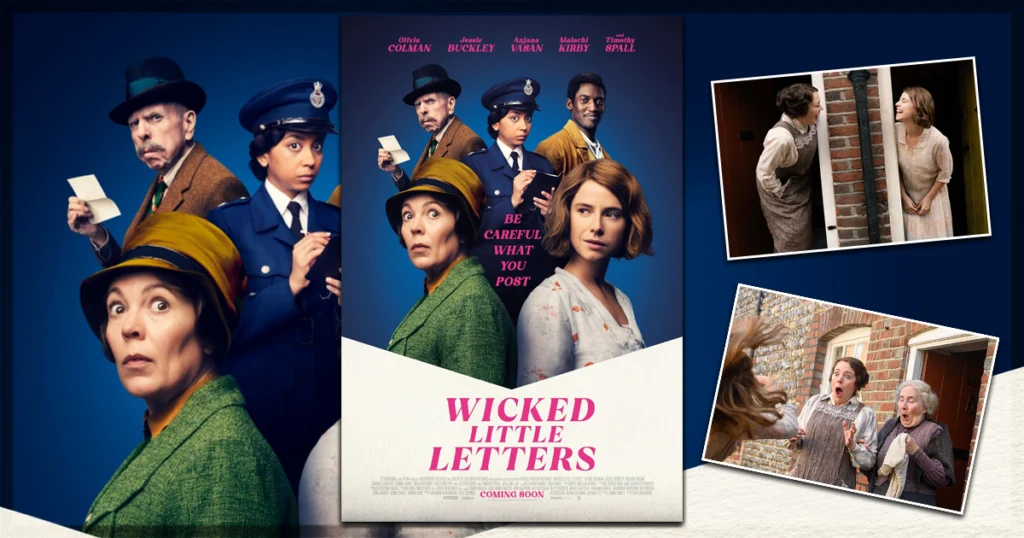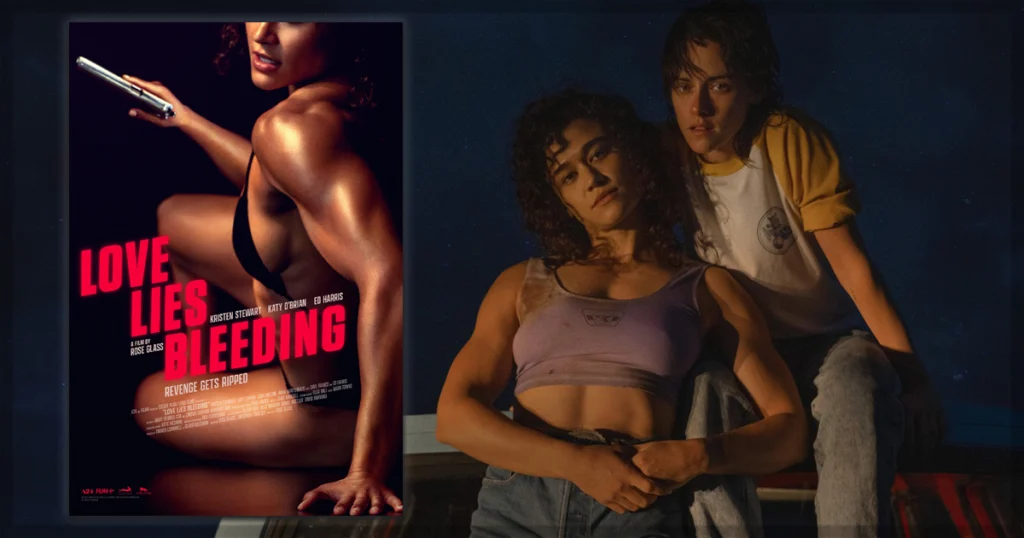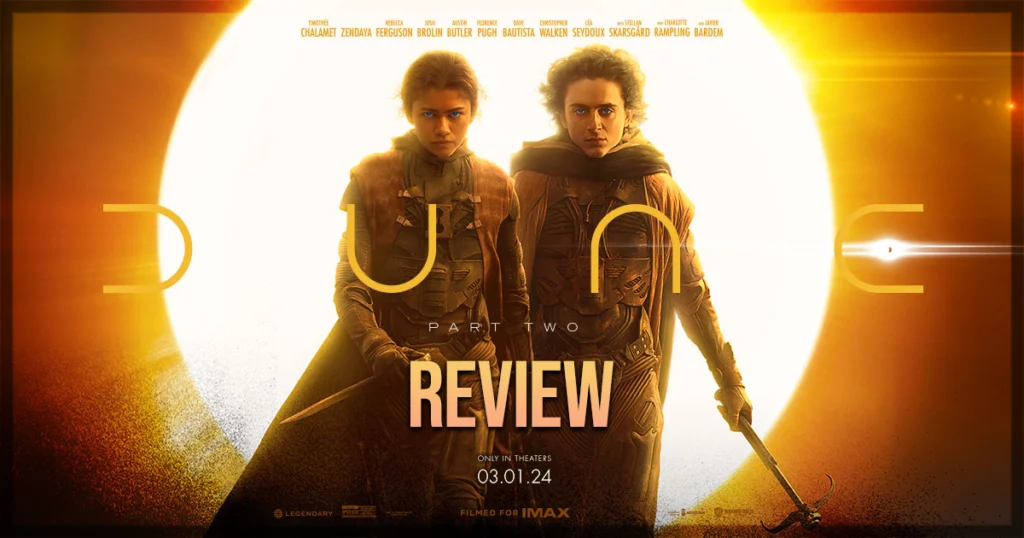Most of us can remember what it was like to be in grade school. There was always some Tommy likes Sally type of drama between pubescent boys and girls, but rarely were there incidents of any note that got the whole school on high alert. Most of those types of dramas are saved for the unfortunate circumstances when a child brought a weapon to school, or there were accusations of sexual misconduct. Well, the new German film The Teachers’ Lounge explores the topic of a theft in a middle school that sends the entire school, staff and faculty, teachers and admin, and many of the students, into a tailspin.
Directed by İlker Çatak, this film, at just over an hour and a half, flies by as the dominoes fall, one after the other, in a series of events that make up some of the best drama you can find onscreen. While a school theft is nothing new, The Teachers’ Lounge extracts every ounce of chaos from its premise, contemplating all angles and intriguing aspects without getting lost in any melodrama.
The Teachers’ Lounge reminded me of the criminally underseen film Boiling Point from a couple of years ago; only a high-end restaurant is a place you’d expect a fast-paced and high-intensity drama to unfold. Both general audiences and critics alike will enjoy getting pulled into this powder keg of a situation and watching the fuse running out, even if some might leave disappointed without the film putting a neat little bow on its ending. Despite the foreign language barrier and subtitles in this spoken German film, don’t lounge around waiting to catch up with this Oscar-nominated movie; you’ll have a blast hanging out in this Teachers Lounge.
The story of The Teachers’ Lounge
We’re thrust headlong right into the start of the “action” as the film opens with a scene of Carla (Leonie Benesch), or Ms. Nowak, as her students refer to her, on the phone. As she speaks to someone, she then searches for a pen to write a number down, and immediately, the score kicks in with its sharp jabs of violin work. Within the first minute, this music begins creating an edge that the film stays poised at, the threat of falling over lingering for the duration of its runtime.
Another teacher beckons Carla to hurry up, and she scribbles some numbers on her hand. She hangs up, slings a brown leather satchel bag over her shoulder, and heads to a meeting. A school bell rings as she makes her way down the stairs; the violin continues reverberating its chords into our ears as Carla enters a meeting between two other teachers and two students. “We need to put a stop to this,” the teacher says. These two “class representatives” are then asked to mention any of their classmates they suspect might have taken some money that has gone missing.
Despite their denial of knowing anything, one of the teachers, Thomas (Michael Klammer), presents the two students with a list of their classmates and goes down the list until one boy gives an audible “Yeah” about one of the names. As Thomas gets the informant to out his classmate, the camera stays fixed on Carla. She stares straight ahead, and we can see the wheels of morality turning in her head; she’s clearly uncomfortable with this situation and its handling. She returns to class, where she has her students stand, and after performing a good morning clapping routine, they turn in their homework assignments.
We watch a couple of minutes of their normal daily classroom activities before an interruption by Thomas and two other teachers. They enter and have all the female students wait outside, then have the boys remove their wallets and place them on their desks before standing aside. As they go through and check the wallets, they find one young boy, Ali (Can Rodenbostel), who has a suspiciously large amount in his. They ask him to come with them.
Carla’s discomfort leads to a sting
All the while, we observe as the camera periodically gives us shots of Carla, looking on and taking in the situation, her solemn face and grave demeanor, again speaking volumes about her comfort level with all of this. The scene cuts, and we’re immediately taken into a meeting. Ali’s parents are summoned, and we watch as Ali stares at the floor while his mother explains, “I gave him the money this morning so he could buy a gift later.” After explaining for a couple of minutes that he would buy a video game for a cousin after school and asking what the meaning behind all this is, Ali’s parents, being from Turkey, begin conversing in their native language.
The German-speaking teachers look on, disquieted by their lack of understanding of what’s being said. As the meeting concludes, Ali’s father says very seriously, “My son doesn’t steal, ever. If he did, I’d break his legs.” Ali’s gaze moves up from the floor to his father after hearing this; he, the other teachers, and we, the audience, would all bet he’d make good on the cold, hard threat. As the first act continues, we work through a few more classroom and gym curriculum sequences. We’re introduced to a few more students and staff members, including one of the school administrators, Ms. Kuhn (Eva Löbau), whose son Oskar (Leonard Stettnisch) is in Carla’s class.
But Carla, deciding to take matters into her own hands, sets up a trap for the school thief and leaves her wallet inside her jacket on a chair in the teachers’ lounge. Her computer camera records her jacket hanging on the chair while she leaves the room. The resulting video, implications, controversy, and accusations of who stole the money sets off a chain reaction of events that threatens to engulf the entirety of the school in complete chaos.
The cast of The Teachers’ Lounge puts on an impressive show
It must be stated that this mostly unknown cast, being led by the wonderful Leonie Benesch and its amazing selection of child actors, are really putting on an impressive show. Benesch has such a fantastic screen presence; her facial expressions and body language all convey the unease we, the audience, feel through these scenarios. The taut script by Johannes Duncker is only directed to near perfection by İlker Çatak, to whom I attribute a vast majority of the reason why this film works as well as it does. His directorial decisions to pull these pieces together, executing so many elements with precision, and making something as benign as a school theft into such a high-octane film that almost leaves you breathless is a work of pure genius.
Although the score was incredibly simple in presentation and sometimes repetitive, the discomforting and uneasy tone helped the film capture what I found to be some utterly brilliant work. Alongside the music, keeping the audience on edge was the editing; many of the shots only linger just as long as necessary and then move on, which helps the pacing to absolutely fly by. Like the incredible Anatomy Of A Fall from this year, everything about The Teachers’ Lounge worked in unison to create a tidal wave of momentum that carries you through to the finish line.
While Anatomy left viewers with a much more well-rounded and satisfying ending, as I mentioned earlier, The Teachers’ Lounge will ultimately leave some viewers wanting more or even a little underwhelmed with how it all concludes. I didn’t mind it and even enjoyed that it wasn’t tied up with a pretty little bow. And really, that wasn’t the point of it all anyway, but that’s probably just my film sensibilities these days. This film’s finale might get on some people’s nerves. Watch out for this one when it becomes available near you; it’s just another little foreign film that proves how amazing international cinema can be.
Final thoughts on The Teachers’ Lounge
There’s a reason why this film made the cut for Best International Feature at this year’s Oscars over the delightful Fallen Leaves or my personal best actress winner Juliette Binoche in the amazing The Taste Of Things. So don’t worry about going to detention this time in school; you’ll find that every moment you spend in this riveting Teachers’ Lounge will be time well spent.
The Teachers’ Lounge is now playing in limited theaters.
You might also like…
‘Wicked Little Letters’ Review: A Decently Entertaining Period Movie
‘Love Lies Bleeding’ Review: A Molotov Cocktail of Brawn, Lust, and Rage (Berlinale)
Dune: Part Two Review: A Spellbinding Follow-Up Full of Action and Subversion




